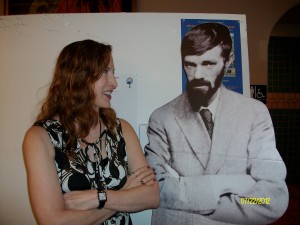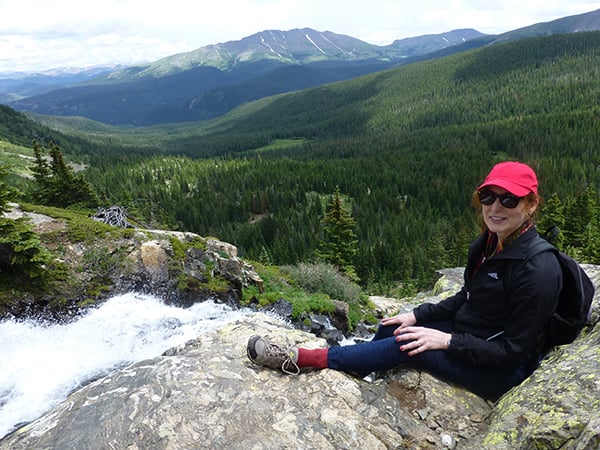I spent the weekend at a screenwriter’s workshop at the Taos Summer Writers Conference in Taos, New Mexico. I am not a screenwriter. And I don’t think I plan to be one, at least not in the near future. I wanted to take the workshop because I’m planning a course next spring on Preaching as Story, and screenwriters know how to tell stories. I had emailed the workshop leader, a screenwriter named Michael Amundsen, ahead of time, asking if someone who had no screenplay in process would be welcome. He wrote back and graciously said he’d be happy to have me in the group.
I flew into AlbuquerqueFriday afternoon and drove to Taos, enjoying the big sky, the craggy outcroppings of mountains, and the tan carpeted ground dotted with scrub brushes.
The 4 cylinder engine in my rented Mazda wasn’t quite up to the hills, but extra pressure on the accelerator got me there just in time for the evening reception and reading. I overcame an attack of introversion –“ I don’t know anyone. I’m not really a fiction writer” with an application of common sense: You don’t fly somewhere and rent a car to spend the evening in your Comfort Inn hotel room.
I entered the big conference room filled with writers. I saw the novelist D.H. Lawrence standing by the door and said hello to him before realizing he was a cardboard cutout.  I then stood in line for a glass of lemonade, and strolled around the room, trying to look as if I fit in. I asked a woman with a friendly face if I could sit at her table. She said “Of course!” and we began talking.
I then stood in line for a glass of lemonade, and strolled around the room, trying to look as if I fit in. I asked a woman with a friendly face if I could sit at her table. She said “Of course!” and we began talking.
All it takes is one friendly face in a roomful of strangers to make you glad you didn’t stay in your room. I soon met the other members of our screenwriting class, a group of 8 women from a variety of backgrounds. Each had a story to tell and was seeking a compelling way to tell it. During our sessions on Saturday and Sunday, Michael Amundsen proved to be a gifted, engaging leader, using his experiences in screenwriting, editing and producing to guide us in a basic course on the craft of screenwriting.
He led us through the basics of plot, character and scene, using film clips from movies past and present: Pandora’ s Box, His Girl Friday, Requiem for a Heavyweight, Man from Atlanta, Days of Heaven, The Killer of Sheep, Tender Mercies, Network, and The UnTouchables. I learned some new information and had some existing insights confirmed.
Here are some nuggets I’ll remember and pass on to students because they have application for crafting sermons as well as screenplays.
The key to generating ideas for novels and screenplays is to notice everything around you. Keep a notebook. Let no observation of life around you go un noticed and recorded.
Show the audience your characters’ emotions. Don’t tell them. “George was thinking about how he would rather be at home.” How do we know that?
“She didn’t get along with her roommate.” Really? Show us that in a scene. That is too general.
“He has a crazy, funny family.” OK, so show us the family being funny and crazy together in a scene.
The screenwriters’ job is to get people involved in the characters and the story.
Don’t start slow. Jump into the middle of the action and fill in as you go. You are under no obligation to have your audience know everything from the beginning. String them along!
Don’t hesitate to cut- scenes and dialogue that don’t work, as painful as that may be for you.
Film editors always cut the scenes in which extras try to hog the shots- smiling too broadly, trying to get close to the stars. Ask yourself- is there extraneous stuff in this scene that is distracting from the story?
Bad dialogue is dialogue that is too detailed, that isn’t the way people really talk and that, as a result, is unintentionally humorous.
For example, a young man talking to his younger brother Bob:
“As you know, Bob, we recently moved to Cincinnati and have been struggling to make ends meet for the past few months.”
Your screenplay must have a theme. Your theme is a tool you use to help you focus. It helps you decide what scenes stay in and which ones get cut.
A good ending should seem inevitable but not be predictable. The audience should say “Of course! But why didn’t we see this coming?”
Don’t ever underestimate the intelligence of your audience. Let them figure things out.
I had to leave right at 4 pm Sunday, at the close of our final session, to get to the Albuquerque airport in time for my evening flight to Dallas. But on the drive I had plenty to think about, mainly how I can’t wait to attend another workshop next summer!












